|
DEATHTRAP by Ira Levin
Wychwood Players New Beaconsfield Hall, Station Road, Shipton-under-Wychwood, Oxfordshire, OX7 6BQ 26-28 April 2018 Deathtrap holds the record for the longest running show on Broadway, and its devious characters and plot twists and turns certainly draw in the audience, and keep them asking, 'What next?' Sidney Bruhl is a playwright of thrillers who has not had a hit in years. He receives a script in the post from Clifford Anderson, a student at one of his workshops, that has great commercial potential. Sidney tells his wife Myra that he is jealous and might just invite Clifford over to murder him and publish the script as his own. Clifford duly arrives, is apparently strangled by Sidney, much to Myra's consternation, and Sidney buries him in the garden. Later, Clifford, bloodied but not dead, bursts through the french windows and apparently batters Sidney to death. Myra is so shocked, she has a heart attack and dies. But Sidney is not dead – it has all been a plot between Sidney and Clifford to kill Myra. But suspicion and jealousy poison Sidney and Clifford's professional relationship, and twist follows twist, ending in each killing the other in a bloody climax. An extra layer is added to the play by Ira Levin, in that the play refers to itself as a play within a play. 'Deathtrap' is not only the title of the play we see, but of the script that Clifford originally sent Sidney, and again which Clifford starts to write after Myra's death. These plays within plays follow the plot of the main play that we, the audience, are watching. This is a show whose script does much of the heavy lifting, but the cast certainly added to the play's success on the evening I went to see it. Aram Gregory played Sidney Bruhl with a laconic drawl, relishing each joking, murderous reference to his wife Myra (Joanna McKerlie) for the chilling effect it had on her. Here was a man who never broke into a sweat, who had it all covered. Except he didn't, meeting his match in Clifford Anderson (Richard J Hartley convincing as student writer in awe of his hero Bruhl). Hartley was also heckled (in good humour) by friends of his in the audience, which could have demolished that fourth wall. Hartley and Gregory, however, carried on without cracking so much as a smile. Well done, chaps. Candida Richards had a peach of a cameo role as Helga Ten Dorp, the Dutch psychic who lives next door, and who has an inconvenient habit of predicting murders and other crimes in the vicinity, and feels called to come and warn Sidney about them. Candida played it up nicely, while resisting the temptation to milk it. Joanna McKerlie as Sidney's wife Myra is given a character to play who is mainly reactive and mainly uncomfortable with most of what is unfolding. She is a follower, not a leader. Joanna resisted the easy option of stock reactions and played each new development and provocative remark by Sidney in a fresh way. Her character certainly gave no justification for Sidney's bumping her off, other than an assumption that they had 'irreconcilable differences'. Finally, Ralph Wears appeared as Sidney's lawyer Porter Milgrim. Cool and laid back, Ralph played Porter as a professional who has developed an almost friendship with his client, and who is happy to tell it like it is, knowing all the while that he's charging by the quarter hour! Porter is the stiff in the suit, who doesn't fit into Bruhl's literary world, but actually quite enjoys dipping his toe in, before retreating to his urban legal world. Ben Curran and his helpers built a great set – one of those groovy apartments seen in American sitcoms of the 1970s – with an impressive array of weapons ancient and modern mounted on the walls. On such furniture-filled sets there are limited options in terms of movement by the actors, but director Julie Downing made the most of what she had. In any case, this was a dialogue heavy piece where the audience's attention was on following the lines of the actors to pick apart the clues, so a more sedentary style was appropriate. One unusual feature was the curtain call in which backstage crew and director took their bows as well. A nice touch. Wychwood Players have given us an assured production of a play that is something of a crowd pleaser. That doesn't mean that success is guaranteed. There are long, long speeches here that test the mettle of an actor in maintaining that narrative drive and emotional freshness through each scene. Julie Downing's band of players did not disappoint.
0 Comments
'Gypsy' - Book by Arthur Laurents, Music by Jule Styne and Lyrics by Stephen Sondheim (HAODS)29/4/2018 GYPSY (Book by Arthur Laurents, Music by Jule Styne and Lyrics by Stephen Sondheim)
Henley Amateur Operatic and Dramatic Society (HAODS) Kenton Theatre, 21 New Street, Henley-on-Thames, RG9 2BP 25-28 April 2018 Don't be fooled by the title, this musical is not really about the life of Gypsy Rose Lee (aka Rose Louise Hovick), the American burlesque performer: it's about her mother Rose. Here we see the story of the archetypal show business mother, the possessive mother, the devouring mother. She says she's pushing her children onwards to fame and success for them, but in reality she's doing it for herself (and lying to herself about her motives). First of all, Momma Rose (Caroline Hopkins) pushes her daughter June (Elanor Mitchell-Luker) as the vaudeville star in the making, but June elopes with Tulsa (Peter L. Phoenix), one of the young men in her mother's troupe of performers. Rose cuts her first daughter out of her life: betrayal deserves no mercy! Next, her second daughter Louise (Katie Healy) becomes the focus of her ambitions, but Rose's efforts for her are no more successful than for June. She has failed her daughters and is on the verge of giving up. When Louise agrees, reluctantly and against her mother's wishes, to become a stripper, and, what's more, becomes very successful at it, her mother's jealousy becomes too much and emotional fireworks result. There's a common pattern that I'm starting to see with many musicals staged by amateur companies. Their singing and dancing are usually of a high standard, but the spoken scenes are often a bit sluggish by comparison, and that was the case, to start with certainly, with the present production. For me the show really took off in the second scene when Rose sang the number 'Some People'. Caroline Hopkins' soaring, expressive voice made me sit up and think: it's going to be good after all. In truth, the non-musical scenes got better as we went through, and towards the end of the first act, we started seeing what this obviously talented cast was capable of. The final showdown between the now confident and successful Louise and her jealous, resentful mother was a scene that crackled with the high octane telling of home truths. The acting easily matched the best of the musical performances. Bringing that level of focus and commitment from the actors in from the very start would have elevated the production to the next level. This is a show with some great musical numbers, and the cast did them justice. I particularly enjoyed 'Mr Goldstone', a great group number that had energy, focus and some great singing and choreography. Top marks also to 'If Momma Was Married', sung by June and Louise – Elanor Mitchell-Luker and Katie Healy really captured the chemistry between the two sisters. Stephen Sondheim's lyrics to 'Small World' brings us the ironic perspective of two people who've been round the block a few times, looking at love without the rose-tinted spectacles, and recognising a need is still there - despite everything. Caroline Hopkins' Rose and Mark Wilkin's Herbie caught the downbeat, world-weary, what-the-heck mood of the number nicely. One question stuck in my mind after the show. According to Caroline Hopkins' biography in the programme, she's been with HAODS for 22 years, but this is the first leading role she's had. Why has it taken so long? Caroline has a terrifically expressive voice, ranging from warmly maternal to gutsy fighter, and she has stage presence. I hope this won't be the last lead that she's given. Credit also to Katie Healy for a Louise who starts off mousey and submissive, and ends up finding herself and her self-confidence. A great transformation. Mark Wilkin as Herbie was the easy going fool for love who finally sees in Rose's ruthless ambition the deal-breaker for their impending marriage. Here was Herbie played as a big softie, a nice guy who realised he was too nice for the woman in his life. Elanor Mitchell-Luker's talent as a singer and dancer gave the character of June as her mother's great hope the credibility it needed. It was possible to believe that June really could have been a star, if it hadn't been for her mother! Finally, one random member of the cast, plucked out the hat, whose several support roles I personally enjoyed was Piers Burnell. He brought us grit, cynicism, the right physicality and (in one case) campness to the various backstage showbiz manager characters he played. The orchestra pit at the Kenton Theatre is, bizarrely, in the middle of the stage, so well done to all members of the cast for not falling in, especially during dance routines! Well done also to musical director Jonathan Heard and his band, who were in the pit, for giving us a thoroughly vaudeville sound to the show. Congrats also to choreographer Emma Broadway. I've seen several sets recently that use hinged walls that fold out and in again, all to good effect. We saw the technique in action for Gypsy. Director Phil Couch and co-set designer Steven Allender came up with a quick and tidy way to transition from scene to scene. Gypsy is a show close to the heart of director Phil Couch and, clearly, inspired by his love of the piece, a lot of work has gone into this production. This is only Phil's second show as a director, and it was an ambitious choice, so extra marks for the higher level of difficulty. In many ways, it's a tricky show to direct. Everyone knows what Louise ends up doing (the famous bit!), but first we have to 'get through' the rest of the story, so to speak, and it's a long first act. That's not to diminish the dramatic importance or entertainment value of the story up to June's departure, but it is an issue for any director. Generally, however, I think HAODS was successful in its efforts and I for one enjoyed my time in the Kenton Theatre. Well done to all. PEOPLE by Alan Bennett
Banbury Cross Players Mill Arts Centre, Spiceball Park Road, Banbury, OX16 5QE 25-28 April 2018 Alan Bennett's waspishly humorous farce takes the rise out of the National Trust's recent transformation into a corporate entity that infantilises visitors to its historic properties. It was being bombarded with information from all directions, and being sprung upon by guides in every room at Trust properties that was the original impetus for Bennett to write this 2012 comedy. The story of People centres on two sisters, Dorothy and June Stacpoole (June Ronson and Hilary Beaton), who live in their ancestral home, Stacpole House, but cannot afford to maintain it. June favours donating it to the National Trust, while Dorothy resists and explores other options. These include selling it to a shady consortium of investors who wish to have it relocated, stone by stone, to Wiltshire, and hiring it out as a film location to an old flame of Dorothy's who shoots porn films. The contrast between the two couldn't be greater. Dorothy hates the idea of crowds tramping through her lifelong home, and abhors it being turned into a museum by the National Trust for people to interact with. Why, she asks, can't it just fade into obscurity and pass unremarked as 'just another country house', instead of being transformed into an exhibit. June is an ambitious archdeacon at the local cathedral, with one eye on the bishop's job. In Ralph Lumsden (Dave Candy), the man from the National Trust, she senses a kindred spirit: he motivated by a corporate vision of increased footfall at properties, underpinned by a zero-wage volunteer workforce; she impelled by a managerial approach to church matters that sees no ethical impediment to, or plain inconsistency in, selling off Winchester Cathedral to the same shady consortium she previously condemned for bidding on her and Dorothy's family home. Dorothy is despairing of the future, but the arrival of Theodore (Dave Smith), her former amour, and his circus of a film crew, breathes new life into her, and the sparkle for life temporarily returns. The filming of the 'adult' movie is pure farce and had the audience laughing. Central to the scene's humour was a sub-plot involving male porn star Colin (Alex Nicholls), who was unable to rise to the occasion and who required 'chemical enhancement' and 'literary' input to meet his professional obligations. His Latvian female co-star Brit (Hana Ayers) merely mocked his predicament. At the moment when the pair are being filmed on the four-poster bed, June enters with the bishop (Terry Gallager) on a tour of the house and proceeds to talk about the room as moans emanate from behind the curtains of the bed. There were some lovely cameos from Jem Turner as ever-so-camp assistant director Nigel, and from Kate Groves as Louise, the production assistant who makes Dorothy feel cared for after so many years of recluse-like life in the house. June Ronson gave us a sympathetically drawn portrait of Dorothy, a woman backed into a corner, for whom life has lost its zest. At the end, with the National Trust in possession of her home, she puts a brave face on it, but the sadness breaks through, and she reveals that she hates this new order. The change of mood and tone was deftly done. Dorothy's companion Iris gets plenty of witty lines, which were delivered by Brenda Williams in a deadpan Nora Batty style. A pleasing bit of character acting. I thought Hilary Beaton gave a terrific interpretation of June, capturing both her frustration at her sister's repeated refusal to see 'sense', and her confident Anglican managerial enthusiasm. Dave Candy's Ralph Lumsden was a nicely drawn personification of the Trust's descent into management-speak and corporate agendas. Everything was enthused about, no obstacle was insuperable. Particularly good was his reaction to the revelation that Iris was in fact Dorothy's and June's half-sister – the result of a scandalous dalliance by their father with a village girl. Instead of respecting the privacy and discretion that Iris and Dorothy wanted, and without missing a beat, Lumsden drooled at the marketing potential, seeing only a colourful detail in the house's history that must be shared with visitors. This has proved somewhat prophetic given the National Trust's new attitude towards its benefactors' private lives. Candy gave a convincing portrayal of a man so focused on his corporate mission that normal human sensitivites are set aside. One negative aspect of the evening that does merit mention is the significant number of prompts that were needed by performers, whose identities I will not be so mean as to reveal. A couple of prompts on opening night can be discounted, but this was rather more. Nuff said, I won't labour the point. Director Ray Atkinson reveals that one of the reasons he came to direct People was because, 'I'm a strong supporter [of the National Trust] and believe in their Forever for Everyone vision'. This had me scratching my head, as the National Trust comes in for plenty of criticism from Alan Bennett, and one's view of the organisation certainly isn't enhanced after seeing the play! People is not one of Alan Bennett's best plays, but there is still plenty here to please an audience, not least Bennett's trademark wit, and Ray Atkinson and Banbury Cross Players have made a decent attempt at bringing it to the stage. DAISY PULLS IT OFF by Denise Deegan
Kingston Bagpuize Drama Group Southmoor Village Hall, Draycott Road, Southmoor, Kingston Bagpuize, OX13 5BY 19-21 April 2018 This was one of those well known shows that, funnily enough, I'd never had the chance to go and see. So I was looking forward to the occasion. Daisy Pulls It Off was directed by Neil Browning in his first directing role for the Kingston Bagpuize Drama Group and was blessed with a mainly young cast. I say 'blessed' because not all groups can call on performers in their teens in sufficient numbers. That KBDG can do so, probably says something rather good about the esprit d'accord of the group. The story revolves around the character of Daisy Meredith (Rebecca Bellis), who wins a scholarship place at the exclusive Grangewood School for Young Ladies. On her arrival, she impresses staff and many pupils alike with her diligence and abilities, but there is snobbishness, jealousy and resentment abroad, particularly in the shape of Sybil Burlington (Andrea Spencer). Sybil and her evil sidekick Monica Smithers (a pleasingly brooding Abi Bellis) plot Daisy's downfall with false accusations of cheating, lying and sneakery. Plucky little Daisy overcomes it all and helps discover some hidden treasure to ensure the school's financial stability to boot. Oh, and she is reunited with her long lost father as well. When the play was first premiered in the 1980s it was very much as a parody of those 'jolly hockey sticks' girls' adventure yarns from the 1920s and 1930s. Forty years on and the perspective has modified slightly. Now it can been seen, at least partly, as an elegy for a lost world – one which was still tantalisingly just... just within reach in the eighties, but no longer so. A culture that sends itself up is by no means entirely out of love with itself, but does not recognise perhaps just how fragile that culture really is. Neil Browning's production re-used the same basic set for all scenes, rearranging the furniture and props as necessary, and subdividing the stage into different rooms – a perfectly good strategy. The one new element introduced in a couple of scenes was a row of large ancestral portraits flown in from above and used to good comic effect when Daisy and her best chum Trixie Martin (Abbie Hale) posed as said ancestors to avoid detection by music master Mr Scoblowski (Mike Lacey). However, Ian Ashby's lighting design could, I feel, have made a bit more of this arrangement. The school sanatorium (up stage), the library (downstage left), the school hall (whole stage), the headmistress's office (downstage right), and so on, could each have had more differentiated lighting set-ups. The production made good use of the space in what was a small venue. This started well with Miss Gibson the Headmistress's entrance. Paula Eastwood delivered a wonderfully effusive, semi-improvised interaction with audience members, whom she took for pupils' parents, stopping to exchange pleasantries as she walked through the audience towards the stage. Later in the show, a few scenes took place off-stage at the front of the auditorium and the main stage area was, as I've hinted, fully used. The predominantly young cast turned in an enjoyable performance, playing the scenes and the jokes straight rather than milking them. We had lots of 'jolly hockey sticks' type characterisation but without going over the top. The whole 'school' feel was enhanced by the hymns sung at morning assembly that punctuated the show (accompanied on keyboard by Jenny Charlton). Rebecca Bellis was suitably stoical and unvindictive as our eponymous heroine, as the misfortunes piled up. Abbie Hale's best friend Trixie kept Daisy's hopes up, even when all seemed to be lost. What wasn't there to loathe about Andrea Spencer's Sybil Burlington? Conniving, scheming and utterly without a conscience, or so it seemed, Andrea held back from turning her into a pantomime villain and gave us, as it turned out, a baddie with issues, who just needed to be loved. Ruby Belcher brought us Clare Beaumont the head girl as a commanding, fairminded, all-round good egg that was one of life's natural leaders. Mr Scoblowski, the mysterious Russian member of staff, was played by Mike Lacey as a shifty character that we were never quite sure about, which was as it should be. Mary Elizabeth Shewry's Miss Granville was the teacher who had her doubts about scholarship girl Daisy from the start, and was suitably disdainful of a pupil whom she was convinced had an inferior moral attitude to her regular girls. Paula Eastwood's Miss Gibson was the headmistress who desperately wanted to see the best in all her girls and, notwithstanding the comic aspects of the role, we saw a believable sense of betrayal when she discovered Daisy's apparently dastardly deeds laid bare. The cast and director appear to have had a good deal of fun bringing this show to the stage, and that came across in the freshness and energy with which the show was performed. It was a pity then that, on the evening I visited, audience numbers were a little on the low side. Well done to all involved. SINGIN' IN THE RAIN by Betty Comden & Adolph Green (screenplay) and Nacio Herb Brown & Arthur Freed (Songs)
Abingdon Operatic Society (AOS) Amey Theatre, Abingdon School, Abingdon, OX14 1DE 17-21 April 2018 Singin' in the Rain must be one of, if not the, best known film musicals from Hollywood's golden age, and when we see it on stage, we want to see it 'like it is in the movie'. Abingdon Operatic Society (AOS) accordingly have aimed at 'a faithful adaptation of the film ...and ...endeavoured to be faithful to the source material and the spirit of the show'. Terry Atkinson's first production for AOS succeeds in that goal, and the result, on the Friday evening performance I attended, was a very satisfied audience. Atkinson was well served by his two lieutenants. Stephen Pascoe (musical director) drew some rich and polished vocal performances from not only the principals but the chorus too. Setting dance routines within the confines of a mere stage, when the audience has, in its memory bank, the limitless space that film can deliver, is always going to be challenging. However, choreographer Judy Tompsett gave us the feel of a big musical production on the not-terribly-big stage of the Amey Theatre. The routine for Good Morning was a case in point. In the movie, Kelly, Reynolds and O'Connor move from room to room in Don Lockwood's Hollywood mansion. Tompsett's dance routine kept the dynamism of the original and included the obligatory walking up and over the sofa (perfectly executed, by the way). Wisely, Atkinson stuck to one main set, achieving scene changes with lighting shifts and prop swaps. One point for attention, however, was the use of music during scene changes (or not), a number of which were either completed without accompaniment or with music that ran out part way through. The stage hands carried out their tasks efficiently enough, but if you have a band there, use them consistently please. While we're on sound issues, the sound levels for the soloists were not always consistent. A handful of times, they blasted out at the limit of what was comfortable. On a couple of occasions, they were a bit too quiet. Something for the techies. The presence at the Amey of a retractable projection screen gave a wonderful opportunity to show clips from the movies of Lockwood and Lamont at apposite moments. As someone who has been involved in film-making himself, I appreciate that these comic vignettes will have taken time and resources to plan, shoot and edit. It will have a been a fun thing for the cast too. All credit to Terry Atkinson, Adam Hoare, Colin Puckey and Mike Ward of the film production team. Our Kathy Selden in this production was Kate Brock, whose voice seemed perfectly matched to the role originally played by Debbie Reynolds. Kate has a beautifully expressive voice with a wonderful colouring to it and it was a pleasure to hear her sing. She was no slouch either when it came to the hoofing. Don Lockwood's part was taken by Paul Bruce, another possessor of a fine voice that could soar romantically when he called on it to do so. The third of the two leads(!), of course, is Cosmo Brown and Tom Draper Rodi gave us a wiry, coiled-up Cosmo close enough to the manner of Donald O'Connor. The show benefited greatly from these three actors, whose singing and tightly danced routines were a pleasure to listen to and watch. Kathy's, Paul's and Tom's voices were not the only ones to bring enjoyment though. Of especial mention is Kerry Callaghan as Lina Lamont, who had not a voice, but The Voice. No one who has watched the movie will ever forget Lina's high-pitched drawl that could shatter windows and strip paint at a hundred yards. To master that voice was Kerry's major challenge. She not only replicated it, but sustained this extraordinary vocal performance through the show, endowing it with a characterisation that at times made the awful Lina sympathetic. Kerry's rendition of What's Wrong with Me? was a well judged balance of pathos and vulnerability on the one hand, and a reminder of why she was destined to fall from stardom in the talkies era, on the other. Bravo! Quick pats on the back to Louis Harrison and Martin Ludden, who played the young Don and Cosmo in the opening number, 'Fit as a Fiddle'. Also to Philip Charlesworth as RF Simpson, film producer, looking and sounding every inch the movie mogul. The songs and dancing were tip top and a pleasure to watch. Where I would sound something of a negative note is on the non-singing scenes that punctuate the set-piece musical numbers. The former seemed to lack a certain energy. Perhaps it was because the directorial gaze was focused just too much on those musical numbers. In any case, the early verbal exchanges between Don and Cosmo lacked a bit of sparkle. I wasn't convinced these were lifelong collaborators since boyhood. In other exchanges, such as Don and Cosmo's with RF Simpson, the actors weren't biting their cues as they should have done, and often, though not always, there was a stillness, even a slight awkwardness, in the exchanges that we didn't see in the musical pieces. We needed those dialogues to crackle more. Final brownie points to the ladies and gentlemen of the Orchestra who provided the big sassy sound that this show needs (and to Stephen Pascoe, again, for directing them). Also to Stuart Beesley and Nigel Milward on lighting. By the way, small point, but I was seated in the balcony, a couple of rows in front of the control box and could hear occasionally loud stage whispers from on high – something to bear in mind for the future. This was my first outing to see a show from AOS, and I was impressed with the professionalism of the company, and that includes the singing and dancing talents of the chorus. When you attempt to replicate one of the great screen musicals the pressure is on, and of course one will always fall short. But, on this occasion at least, the distance between aspiration and achievement was impressively small. THREE ONE ACT COMEDIES: HEROINES, HAMLET AND A COUPLE OF SLICES OF HAM
MERRY REGIMENT OF WOMEN by Rae Shirley, POOR YORICK by Phil Mansell and MELONS AT THE PARSONAGE by Nick Warburton St. Peter's Players Wolvercote Village Hall, 1 Wolvercote Green, Oxford, OX2 8AB 11-14 April 2018 This was an imaginative selection of one-act plays which, coincidentally, according to the programme notes, all reference Hamlet in some way. Despite that, these were three very contrasting pieces. In Merry Regiment of Women by Rae Shirley six of Shakespeare's female characters are called to a meeting by Lady Macbeth (Clare Winterbottom). The aim is to protest to Shakespeare about the lack of women's roles in his plays. It was an amusing premise, and what was further impressive about the writing was that it used Shakespearean style language without sounding hackneyed. This authenticity even extended to characters exiting on a rhyming couplet. I liked the rivalries between several of the female characters: Juliet's Nurse's (Elizabeth Kirkham) constant, catty put-downs of Cleopatra (a fine debut with the group by Zehra Kelly) as a monarch of loose morals, and Kate the Shrew's (Jane Hemmings) sneering disdain of love, as expressed by Juliet (Charley Middleton), and the rather more lustful longings of Desdemona (Nancy Hillelson) and Cleopatra. The onstage lovey-dovey canoodling of Juliet and her Romeo (Will Hazell) was funny in its over the top way and had Kate's eyes rolling. In the end, love conquered all, and Lady Macbeth's plans came to naught. Even Kate the Shrew, her staunchest ally through most of the story, was eventually talked round to love by Petruchio. The main opposition to Lady Macbeth, however, came from Henry V (Tony Bywaters) who delivered the sort of heroic speech one would expect of Hal. My main critique of the performance is that it could have benefited from a little more energy. There are some sparkling exchanges here, ripe for the comedy picking, but they came across occasionally as underpowered. Henry V's speech, for example, needed a bit more swagger. Yvonne Janecek was directing on her own for the first time, so this is maybe something to bear in mind next time. I would also like to have seen a bit more use of the stage space, as the characters were standing in a row a bit too much in some sections. On the plus side, however, Yvonne drew some great characterisation from her actors, for which she deserves to be congratulated and is a not inconsiderable achievement. Poor Yorick by Phil Mansell was my favourite of the three plays on offer. I understand that it was originally performed at Stratford as part of the RSC's programme to encourage new talent. Hamlet's jester Yorick (Andrew Churchill Stone) has not died; he has left Elsinore Castle to develop a career in a new type of comedy called stand-up, but it's not going very well. He is persuaded by his girlfriend, tavern wench Bess (Zehra Kelly) to go back to Elsinore and ask Hamlet (David Smith) for his old job back. But things have changed and Claudius is now king. Yorick is drawn in against his better judgement to help Hamlet to kill Claudius and claim the throne, by means of a gunpowder-filled whoopee cushion. It all goes horribly wrong and Yorick is back to square one. First-time director Annette Jaggard made an inspired casting decision for the title role. Andrew Churchill Stone's performance held the piece together with drive, beautiful comic timing and a characterisation that kept reminding me of Tony Hancock. Not in his voice, but as the little man battling against an unsympathetic world, only to see his plans come to nothing. The opening comedy set with Yorick performing to a hostile tavern crowd contained some great material that had the real (Wolvercote) audience laughing out loud. Zehra Kelly's sparky Bess was the perfect foil for this dreamer ahead of his time. David Smith brought us a wonderfully depressed Hamlet with a hangdog expression. Top marks by the way for the set design of Hamlet's room, festooned with teenage posters that were actually Pre-Raphaelite and other paintings of young women, and empty beer cans on the floor. His revelation to Yorick that he actually liked his new material and was tired of the pig's bladder routines of other jesters brought us a discussion by the two men that sounded rather too close to a certain brand of 21st century stand-up comic, who invests his or her role with a tad too much cultural importance. A moment to savour for the audience. Tony Bywater's Ghost of Hamlet's Father presented us with an utterly fed-up hen-pecked husband. One of the funniest devices was that Hamlet's mother Gertrude (Yvonne Janacek) had reacted to the grief of her first husband's death by turning Jewish. This was an absurd idea with a lot of comic potential, but I feel a bit more could have been made of this. An over-the-top Yiddish momma accent might have helped. But there were some great lines that were delivered well. Finally, St Peter's Players presented Melons at the Parsonage by Nick Warburton. This was the tale of two amateur theatre groups who tie for the main award at a drama festival and are obliged to go through a bizarre process to decide the winner. First, they have to reprise a scene from their own production and then perform a scene from the other group's piece. Warburton set this up nicely by have sharply contrasting drama groups: one performing a pretty appalling murder mystery at a country parsonage (Pete Welply, Annette Jaggard and Jane Hemmings); the other an experimental theatre group called Frantic Jam doing a surreal performance about rats trapped inside a melon to pulsating music and strobe lighting (Will Hazell, Aaron Percival and Charley Middleton dressed all in black, natch). Each side continually tried to undermine the other's performances with what in cricket would be called sledging. The piece contained a lot of physical humour and director Clare Winterbottom clearly worked her cast hard to get these routines and melées fluent, which was one of the reasons why the audience seemed to like this one best. The final tie-breaker round, in which both sides had to recite Hamlet's 'To be, or not to be' soliloquy quicker than the others turned into a scrum that kept its energy levels high and focus on the moves pin sharp. A lot of sweat went into this piece and the result was an audience in stitches. One plea to the amateur theatre community of Oxfordshire. This is the third production I've seen within the past month that takes as its subject matter amateur drama groups who mess up. Although I enjoyed each play, the phrase 'too much of a good thing' comes to mind. Just a thought. St. Peter's Players did well to bring together such different comedies in one performance. Given that many of the actors appeared in more than one (and in three cases, directed and acted in different plays), their stamina and commitment is to be commended. For myself, this was an evening in which I laughed out loud many times. The programme said, 'We hope you all enjoy the three plays on offer and leave the hall with a smile on your face!' I certainly did, and I was far from alone. A BUNCH OF AMATEURS by Ian Hislop and Nick Newman
AmEgos King Alfred's Academy Theatre, Portway, Wantage, OX12 9BY 12-14 April 2018 A Bunch of Amateurs, by the long standing comedy writing duo of Ian Hislop and Nick Newman, was originally written for the big screen and premiered in 2008 at that year's Royal Film Performance. It boasted a big name cast that included Burt Reynolds, Derek Jacobi, Imelda Staunton and Samantha Bond and was an immediate hit with H.M. The Queen, so much so that she asked for a further screening at Sandringham that Christmas. It tells the story of washed-up Hollywood action hero Jefferson Steel, who hopes to reignite his waning career by accepting an invitation to play King Lear at Stratford. But he discovers on his arrival in England that he will not be performing with the RSC, but with the Stratford Players at Stratford St. John in Suffolk, who hope that Steel's presence in their production will help raise money to save the local theatre from being bulldozed for executive homes. This is character-based comedy and has the feel of a TV sitcom about it (and that's not a criticism), and Hislop and Newman have given us some beautifully drawn characters. So how did AmEgos' production of the stage version play out to the good people of Wantage and beyond? Very well, as it happens. This was a well cast performance in which the actors seemed to have really inhabited their roles and made them believable, even though, being a farce, the plot itself required a certain suspension of disbelief. At the centre of the action was Jefferson Steel himself, played by Stephen Rees, whose New York accent did not slip once; his cynical, sardonic ripostes to the inhabitants of what he termed 'Loserville' hitting the spot time and time again. Jefferson's transformation from hard-bitten egotistical star, to a man who has overcome his personal demons and reconciled with his estranged daughter is skilfully played by Stephen. His shambling, shuffling physicality, that caught this character, reminded me a lot of Ian McShane as Lovejoy. Jefferson's rival is Nigel, the local solicitor, who wanted to play Lear himself. His constant sniping remarks about Jefferson's lack of acting ability and personal shortcomings, both to his face and behind his back, were brilliantly delivered by Duncan Sinclair, who had this annoying, pompous and ridiculous figure of to a tee. Nigel is a wonderful comic creation, based on a type of character that we've all encountered at some time – someone with a measure of talent, but who over-estimates how much talent he has, and how much credibility he loses by constantly boasting of his own past thespian achievements. The Stratford Players' director Dorothy was played by Lesley Phillips who was, in a funny twist, also the director of A Bunch of Amateurs. So she was directing herself directing a play. Dorothy is used to being obeyed and faces down Jefferson Steel with his celeb tantrums from the start. In the end, the reformed Jefferson proves to be a romantic magnet for her. Lesley convinced as the character who drives much of the play's action, having to deal with, and negotiate around, the quixotic behaviour of her band of performers. Her character's confidence was rightly more grounded than the puffed up self-belief of either Jefferson or Nigel, and Dorothy's centredness, as played here by Lesley, is what gives this ensemble piece much of its gravitational pull. I liked Rob Thorpe's interpretation of Denis, the local plumber who acts as set-builder, electrician and general odd-job man for the Stratford Players. In addition to which, Denis is playing the Duke of Gloucester in Lear, and one of the running gags of the play are his inappropriate special effects solutions to the blinding of Gloucester. But Denis was never happier than when he was discussing the technical merits of different brands of nail gun with a nonplussed Jefferson. Rob gave us a techie in Denis who was oblivious to social appropriacy. Quite right too. Mary is a lady of a certain age who is besotted with Jefferson Steel, but the feelings are not mutual. Her growing sexual frustration and jealousy towards other women, who seem to have won Jefferson's attention, leads to clouded judgement and a misunderstanding that results in what Hollywood scriptwriters term the 'all is lost moment'. In this case it was a compromising tabloid newspaper report that disgraced Jefferson and threatened to derail the whole King Lear production. Helen Harding gave us a Mary who became increasingly desperate and bitter, and more hilarious, as the play progressed. Her emotional frustration and jealousy went head to head with her natural decency and modesty, and the internal conflict was a joy to watch. Stratford Players' main corporate sponsors are local microbrewery Bell Ales, who have paid for Jefferson's flight and other expenses. The owner's wife Lauren appears with samples of the brewery's beers and is keen to get photos of Jefferson sipping the product (he spits it out in disgust). Later on, her physiotherapist's skills deployed on Jefferson's aching lower back are misinterpreted by Mary as more than just remedial medical treatment. Sam Winskill played Lauren in a well judged performance of part-PR person for a local small business and part-budding amateur actress who just wants to make sure the Stratford Players are successful. Georgina Volkers was Jefferson's estranged teenage daughter Jessica, and although the American accent sometimes drifted in and out, her characterisation of a girl who is resentful of her father's neglect and general uselessness as a dad worked well. Georgina brought us a range of facial expressions that said WTF about her stage father in so many different and amusing ways. Lesley Phillips chose a sparse set in which to stage 'Amateurs' and I, along with some other audience members I spoke to, thought this was the right choice. Credit therefore to Rob Thorpe, John Gale and Elliott Winskill for constructing it. With a more minimal set, lighting becomes all the more important and Lucy Bailey gave us the right emotional moods against a predominantly black backdrop. The interspersing of scenes with Shakespearean songs that referred to the action just finished was a nice structural element. One of the characters wearing the Fool's cap performed this under a spotlight with a freeze-frame tableau of the last scene in the gloom behind. Co-writer Nick Newman has said that the play is about the redemptive power of theatre. If that was the aim, then farce was perhaps not the most appropriate genre in which to realise that message. I would say rather that it was about a man learning humility and how to love, with theatre as the occasion rather direct cause of that redemptive process. One reservation I had with it, though, was the way that all obstacles were conveniently overcome and all characters were reconciled at the end. There was too much of the Hollywood fairytale happy ending, devised to make a point, about it for my taste. Having said that, this was farce, and the well-drawn characters and the chemistry of their rivalries, loves, envies and frustrations were enough to justify the ticket price alone. Congratulations to AmEgos on another success! A MORE PERFECT WORLD by Tony Green
Abingdon Drama Club The Unicorn Theatre, Medieval Abbey Buildings, Checker Walk, Abingdon, OX14 3JB 11-14 April 2018 Tony Green's thoughtful and engaging new work A More Perfect World, about the experiences of those who participated in the First World War, had about it the flavour of what academic historians call the historical method. This is the standing back from events, the careful sifting of evidence on both, or all, sides of an argument, and the drawing of a conclusion that tries to avoid the hyperbole of 'all-or-nothing' thinking. So the revelation in the programme notes that Tony had read for an MA on the First World War came as one of those 'ah, yes, of course' moments. Don't get me wrong, this play was far from a dusty academic treatise. It was an evening's entertainment that I'm pleased I took the trouble to see. It was an attempt to construct a story of three people's experience of the Great War that avoided cliché and the myths that have clung like barnacles to the popular 'memory' of that conflict. It was also a piece that wanted to entertain us, using empathy and humour to make its points. Complex structures that fascinated and impressed were the order of the evening, both in the three-plays-in-one arrangement of the story and the set design that rivalled the ingeniousness of an Elizabethan priest-hole builder, more of which below. Our three main characters are Wil [sic] Fowler, who served as a private soldier in the trenches, Colonel Rennett-Chalmers, who joined the General Staff during the war, and Samantha ('Sam') Talbot, a member of the Voluntary Aid Detachment (VAD), who were auxiliary nurses and carers. We see them over two time periods: during various episodes of the First World War, and in 1978 as they are about to record their memories of the war for a television programme commemorating the 60th anniversary of the conflict. But the play opens in the present day (2018) with a history professor (played by Colette Lardner-Browne) also preparing to speak in a television interview to mark the centenary of the war's end. Over the course of the war, Wil (Harry Rowe), Rennett-Chalmers (Tom Atkinson-Seed) and Sam (Charlotte Griffiths) lose their innocence, but not their decency, as, respectively, the brutality of the trenches, the high casualty rates and the suffering in the hospital wards affect each of them. The young Rennett-Chalmers starts to question the strategy that is costing so many men's lives for so few yards of territory. But it is a court-martial on which he sits that affects him most deeply and enduringly. The older Rennett-Chalmers (Jon Crowley) is still pained by the sentence of execution for desertion that he and his fellow officers handed out. By contrast, the older Wil Fowler (Keith Hales) has survived emotionally much better from the experience, ironically so, as he saw more frontline action than the other two. The older Sam (Geraldine Hobson) likewise presents a more emotionally grounded figure. For both Wil and Sam, the war appears to have had the unintended consequence of personal growth and rounding of their characters. There is a tension through the play between popular conceptions of the the war, moulded by establishment and media political agendas, and the evidence of the participants' experience of actually fighting the war, and it is this (to me, at least) fascinating conflict of ideas that forms the spine of the play. We see it in the conversation between Private Wil Fowler and Corporal Bramley (Kieran Piggott) about the former's attempts to write poetry about the war. Bramley opines that it would make more sense to write verse about women because that is certainly what occupies his mind all the time. It is also a challenge to the notion that the War Poets such as Owen and Sassoon are the only authentic voice of the fighting man. We also see this tension between myth and reality in the picture painted of the officer class. This was one of the most noteworthy and brave aspects of the play. To challenge the 'lions led by donkeys' trope that dominates depictions of the conflict is to challenge the 'authorised version' of the First World War. Such narratives are underpinned by ideological views about class and war itself that are, in 2018, seen as de rigeur in polite company. The older Rennett-Chalmers' revelation that over 200 generals were killed or wounded in the war (it's true, I checked), and that, as a member of the General Staff, he tried to visit the battlefront as frequently as possible, as did other senior officers, drops a bomb (no pun intended) on that particular myth. It reinforced the view of the history professor in the opening scene (set in 2018) that Field Marshal Haig was not the mythical monster who sent thousands to their deaths with never a second thought. Interesting too was the argument young Rennett-Chalmers has with his C.O., Colonel Mead (Dave Cassar), over the Battle of Verdun. Mead is allowed to put forward a strategic justification for the British involvement, and large casualties, in aiding the French that is not mocked or sneered at, or of which the audience is invited to disapprove. This is a view of history without the pantomime heroes and villains. It is the final speeches of the three principal characters in 1978 that pack the most punch however. Rennett-Chalmers, we learn, not only felt guilty about avoiding most of the danger as a staff officer, and preserving his life where others lost theirs. He subsequently lost his own son, who was killed as an airman in the Second World War. An ironic twist of the knife which he has borne with quiet dignity all this time. Wil Fowler, a normally jolly character, becomes angry about how the myth-makers have started to rewrite history and present a different version of events from the one he lived through. Another theme surfaces again – the notion that the views and testimonies of ordinary men and women who served in and experienced the First World War can be discounted as ill-informed, uneducated, even stupid. Sam Talbot addresses the position of women during and after the war, but again challenges the myth-makers. Yes, she says, women had the opportunity to do things they had not had before. Yes, their self-confidence grew. But, she says, she won't be giving a speech about liberation and emancipation. What actually happened was that women rejoined their men (those who had survived) and just 'got on with life'. The final scene is back in the present day with the history professor. She chats with the production assistant (Lissy Coppock) about the desire of the popular media to make 'sexy' history. As if to prove the point, after the professor's departure, the assistant is told by the voice of her unseen director (Lin Crowley) that the film footage of Rennett-Chalmers' 1978 interview will probably not be used because it doesn't fit the narrative (of WWI officers as 'pompous conservative figures'). This was a production blessed with a strong cast. The actors playing Wil, Rennett-Chalmers and Sam in both their young and old incarnations (named above) turned in assured performances. There were also strong showings from Kieran Piggott as an avuncular Corporal Bramley, Lucy Wilton as Sam's jolly fellow VAD Elizabeth Copperington-Cook and Dave Cassar as Colonel Mead. There were one or two first-night wobbles with lines in a couple of the longer speeches, but the actors concerned covered effectively and carried on. This was generally a confident effort all round. Michael Ward deserves praise for his set design. This was an arrangement with hinged walls that brought us the trenches, a hospital ward and a television green room all with a few pushes and pulls by members of the cast. There was also the gauze-walled 'crying room' (my name for it, not his) where nurses would retreat after having a soldier die in their care, used to great effect in one scene with the young Sam. There were the obligatory shell blasts and machine gun fire effects, of course, but this was not a play that was about blood, gore and slaughter; it was, as Tony Green wrote in the programme notes, an attempt to create characters who were people not simply victims. Director Maria Crocker deserves credit for bringing to the stage a piece that tackles some difficult themes and a view of the Great War that seeks to humanise all its participants. GODSPELL by Stephen Schwartz
Musical Youth Company of Oxford (MYCO) Oxford Playhouse, 11-12 Beaumont Street, Oxford, OX1 2LW 4-7 April 2018 Godspell is, in the words of MYCO director and choreographer Guy Brigg, 'chock full of iconic songs and toe-tapping tunes', and the talented youngsters of this amateur group with professional standards did full justice to the song and dance numbers. Perhaps the best-known songs are Day By Day and Prepare Ye the Way of the Lord. The original Godspell was set in a circus with the character of Jesus played as a clown. In MYCO's production, the location moves to a post-apocalyptic dystopian city whose setting and characters reminded me of Walter Hill's 1979 movie The Warriors. The change was certainly for the better. There is always a challenge in staging any play or film with Jesus, as he is an unplayable character. Any attempt to play him with the emotions and foibles of a mere mortal inevitably diminishes him. This was the conundrum that Franco Zeffirelli discovered when filming Jesus of Nazareth. Actor Robert Powell, who played Christ, recounts that they made a decision that he should be played without any characterisation at all, as far as possible; that the words would simply be delivered, and the audience would then project on to Powell their own image of Christ. The ruse worked in spades. Godspell suffers from the same problem. As a clown, the figure of Jesus was trivialised. In the present production, Jesus (Zakkai Goriely) is played as a rather soppy youngster prone to hissy fits when his disciples don't 'get it'. It's probably best to get my other quibbles with this production out of the way now, so we can get on to the aspects of the show that merit praise (and there were plenty of those). First, cross casting no longer shocks, in fact it's rather 'last month'. Nevertheless, there should be a dramatic justification for it. The director doing it 'because he can' isn't good enough. John the Baptist (or Jay TeeBee) was played by a female performer (Ellie Grieve), but with no explanation why and no immediately obvious reason. Ellie sang brilliantly, her clear tones ringing out Prepare Ye The Way of the Lord, but, to use a rather tired biblical metaphor, hers was the voice of an angel, not that of a prophet. Second, the original show courted some controversy by not having a Resurrection. In MYCO's production, Jesus does appear to rise from the dead, appearing for the finale dressed in white, but...accompanied by Jay TeeBee, also in white. The director's programme notes gave no clue as to the rationale behind that decision, neither did they mention why Judas (a wonderfully weasily and cynical Isaac Jackson) does not hang himself and is in fact forgiven by Jesus. Given that this show touts itself as based on the Gospels, a playing against the original text, so to speak, in such a significantly symbolic way, demands more than silence. Whatever plot and casting reservations the present reviewer may harbour, the ability of the cast to deliver powerful song and dance numbers is not in doubt, and the audience was intensely appreciative of the sheer vocal and physical talent on display on stage. MYCO adapted a piece originally intended for ten performers into a show with five times that number on stage. The mere size of the on-stage numbers impressed, even overwhelmed, but in a good way. Congratulations are due to choreographer Guy Brigg and assistant choreographer and dance captain Eleanor O'Connor for designing and co-ordinating such complex routines that were slick, polished and intoxicating. Praise also to musical director Julie Todd for drawing out of the cast of teenagers some extraordinary vocal performances. The show was set in a scrapyard-cum-urban wasteland and was meant to symbolise the disaffection and chaos of a grey, dystopian world, into which Jesus enters as a sign of hope. The set designed by Guy Brigg and Liz Nicholson made use of a two-tier structure, and the relationship between the large balcony and the main floor was well exploited. The Sermon on the Mount used this to powerful, and even comic, effect. Members of the crowd above took turns to shout out 'Blessed are...etc.' to Jesus standing below, who had to improvise the various tag lines, 'For they shall...' A thumbs-up also to Ashley Bale for his excellent lighting design. It's a show that can provide a lot of fun for the lighting department and they rose to the occasion. Maybe I was in the right mood, but I kept noticing how well matched the lighting arrangements were to the moods of the scenes. It is impossible to single out individual actors in such a strong ensemble performance, but standout numbers included Turn Back O Man, with the lead sung by Sonia (Saffi Needham, vamping it up in a bravura burlesque performance) and Bless the Lord (Ellis Lovett as Joanne in an amazing vocal performance that was, unsurprisingly, reprised as an encore to appease the cheering audience following the curtain call). But in truth, there were no weak links amongst the principals who all delivered their solos with a maturity that belied their teenage years. This is the first time that I've seen a show by MYCO, but it won't be my last. OLIVER! by Lionel Bart Jigsaw Stage Productions The Beacon, Portway, Wantage OX12 9BX 4-7 April 2018 Cornerstone Arts Centre, 25 Station Road, Didcot, OX11 7NE 26-28 April 2018 Lionel Bart's musical version of Charles Dickens' novel Oliver Twist premiered in London's West End in 1960 and has been drawing large and enthusiastic audiences ever since. When I spoke to director Gill Morgan ten days before the opening night, she described it as containing 'music that everyone knows' and 'a toe-tapping show'. If this production was meant as a crowd-pleaser, then the verdict comes in two words: mission accomplished. The crowd on the evening I attended was indeed well pleased. Jigsaw Stage Productions had two teams of children, who alternated between performances. On the Saturday night I was there, Team 1 was on stage. Opening a show is never an easy task, but the orphans made a generally confident start with their rendition of Food Glorious Food. A slight quibble in an otherwise solid first number – the first word of several lines was lost – a result of nerves, I'd say. The production took off for me with the duet between Mr Bumble and Widow Corney (Paul Bowers and Karen Brind), I Shall Scream!, where the beadle, starved of physical affection, attempts to plight his troth to the amply-resourced widow. We saw some lovely comic moments from both performers. We also had some nice characterisation from Mr Sowerberry the undertaker (Charlie East) and Mrs Sowerberry (Chris Jones) who take in Oliver as an apprentice and treat him appallingly, but the musical number that ends the scene (That's Your Funeral) was a little lacking in energy for my taste. A bit more oomph was needed. The stage then emptied leaving Oliver (Thomas Hulme) alone to sing Where Is Love? I was impressed by the performance of this young actor, who brought the requisite pathos to the part. The other main children's part, of course, is the Artful Dodger and Felix Potter made a strong start in the role with his rendition of Consider Yourself. Praise too to Karen Brind for choreographing the dance routine that followed (and for many other numbers in the show, particularly Who Will Buy?) as well as to her dancers. Edmund Bennett clearly relished his role as Fagin and gave us a rogue with a warm, avuncular affection for his gang of thieves. Pick a Pocket or Two came over well as a parlour game for the benefit of the newly arrived Oliver, and his final song Reviewing the Situation saw Edmund doing justice to what is a difficult song to perform, both in technical terms and comic interpretation.
Fagin lives in fear of Bill Sikes, and hardly surprising when played as a brutal, irredeemable thug by Chris Palmer. There is nothing good to be said about the character of Sikes: he is a criminal, he beats his wife, is possessed of a demonic malevolence, and glories in the fear that the mere mention of his name brings to others. Chris brought a brooding physicality to the role and made us believe he was truly a nasty bit of work. I particularly enjoyed his performance of the song My Name! For me, the three best numbers in Jigsaw's production were It's a Fine Life, Oom-pah-pah and As Long as He Needs Me. Not by coincidence did they all include Helena Kerswell playing Nancy, who gave a truly fantastic musical performance (my goodness, that gal can sing...and act the songs!). It's a Fine Life lifted the show to a higher level and As Long as He Needs Me was given the sympathy and gusto so vital to a torch song such as this. It drew loud cheers from the audience and deservedly so. Congratulations are due to the other members of the cast, young and old, all of whom contributed to a thoroughly enjoyable performance of a well known and well-loved show, into which director Gill Morgan injected a dose of freshness. On a practical note, the cast doubled up as stage hands, shifting scenery and props as soon as they had stepped off stage (no black-clad stage ninjas for Jigsaw). The arrangement worked well with no hiccups that this reviewer could see. A final pat on the back goes to musical director Jevan Johnson Booth and other members of the band who gave a professional sound to an amateur production. Oliver! transfers to Didcot's Cornerstone Arts Centre at the end of April. Get yourself a ticket if you want to give your evening a bit of oom-pah-pah! Photo copyright Howard Hill |
About the Author
Mike Lord has been involved with amateur theatre for over twenty years, mainly as an actor but also, more recently, as a director. Archives
July 2019
Contact me
Please use the Contact Form for anything apart from comments on blog posts. |
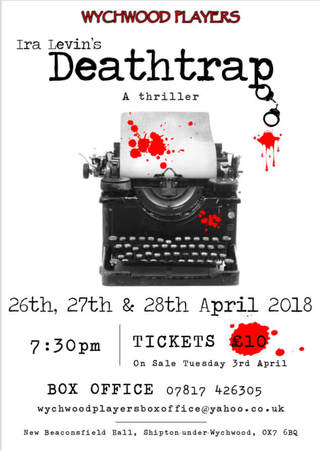
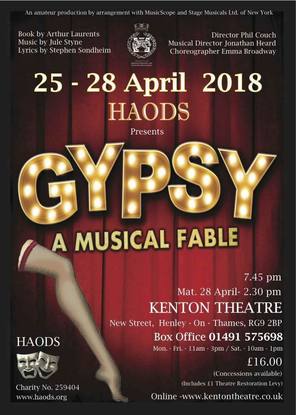
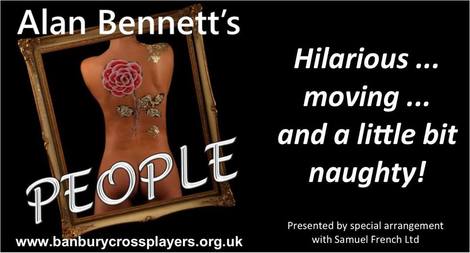
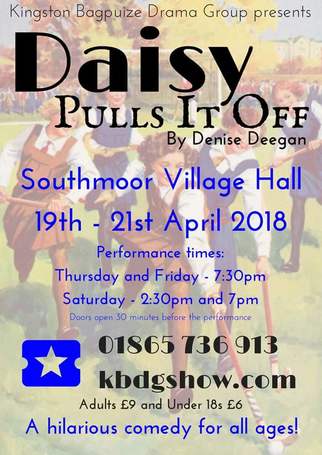
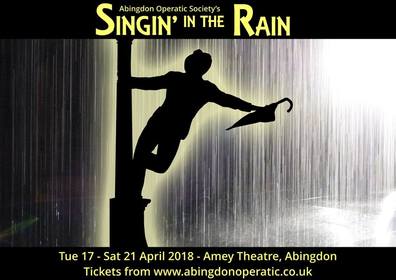
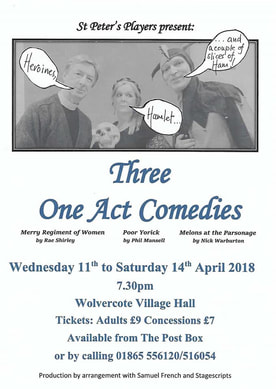
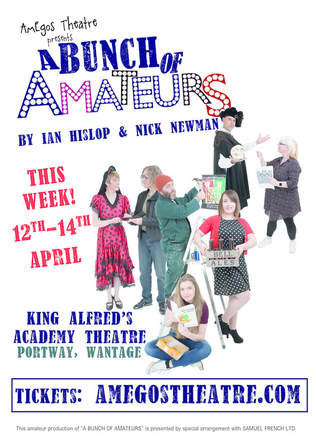


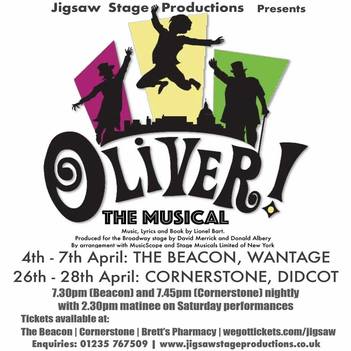
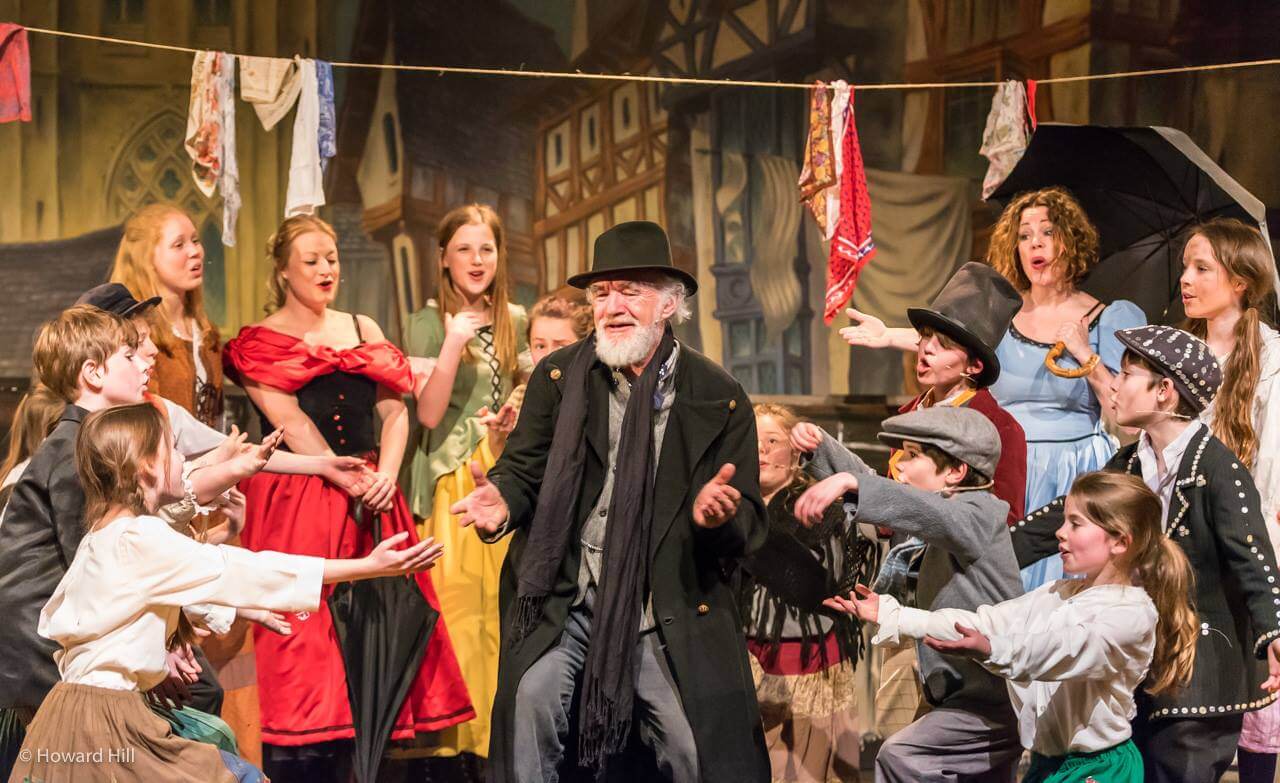
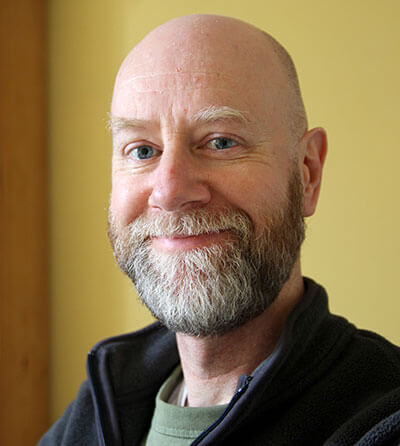
 RSS Feed
RSS Feed
